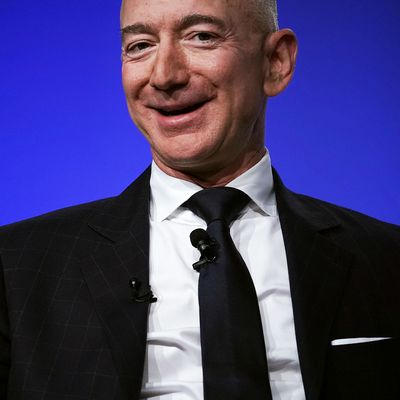
The 2018 American Institutional Confidence Poll, sponsored by Georgetown University and the Knight Foundation, asked Americans about 20 institutions in American life, from the military to the Executive branch of the federal government to Google to religion. The survey found Amazon was America’s second-most-trusted institution, trailing only the military.
Such a favorable view might seem a little surprising when you consider all the political criticism Amazon has faced over the last few years.
Democrats have dinged Amazon for its pay and labor practices, avoiding sales taxes, and for being a suspiciously large, arguably monopolistic player. And the Republican president has pursued a vendetta against the company, accusing it of taking the postal service for a ride and “killing shopping malls.”
Yet the public doesn’t just like Amazon; they love it. Democrats rated Amazon their most-trusted institution. Republicans ranked it third — just ahead of the Executive branch, which Donald Trump runs.
This is worth remembering as you watch the political and media blowback over the very rich subsidy deal New York’s mayor and governor have offered to Amazon.
Conservatives hate the deal; leftists hate the deal. The Wall Street Journal editorial page and Democratic Socialist congresswoman-elect Alexandria Ocasio-Cortez agree: Amazon is getting something it doesn’t need or deserve. You should not assume the broad, Amazon-loving public will share their objection.
Why is Amazon so popular? Because it does what it says it will do. It tells you it will get products to your door within two days, and then they appear, at a reasonable price.
In a time of widespread institutional failure — when political parties promise things they know they can’t deliver; when banks fail and bring the economy down with them; when the church can’t follow its own moral standards; when other tech companies are consumed by scandal — Amazon stands out as a huge entity that keeps its promises, or at least its promises to consumers. And that is overwhelmingly how the public interacts with and thinks about Amazon: not as workers, and not as ideological planners evaluating how the whole economy should work, but as consumers.
That doesn’t mean necessarily that people want the government to just hand Amazon big sacks of cash as a thank-you for not failing in the same way so many other institutions do. But that’s not how the subsidy deal is framed.
As I wrote on Tuesday, I think the argument for the subsidy package is ultimately wrong, but it’s not crazy. Governor Andrew Cuomo and Mayor Bill de Blasio have a theory of the case: By bringing Amazon to Long Island City, they hope to build a New York tech cluster to rival Silicon Valley, create a true commercial office core in Queens that will produce tax revenues for decades to come, and diversify the city away from the financial sector.
And it’s not just Amazon that’s popular. Cuomo and de Blasio are popular, too, and as with Amazon, their popularity runs counter to the media narratives you often hear about them.
Cuomo’s positioning as a subsidy-doling pro-business Democrat hasn’t pleased the right or the left, but New York voters have rewarded him with three landslide elections. De Blasio, the seemingly hapless, late-sleeping mayor who never got the national profile he craves and could hardly have a worse relationship with the tabloids, in fact has a solid record of policy accomplishment that allowed him to win a landslide reelection after his landslide election.
These popular figures got together with Amazon and have proposed a shiny project that allows them to tell an optimistic story about the future of New York. They all seem to know something about public attitudes that you do not. Do not assume they have made a political mistake.





























